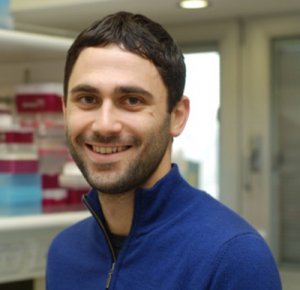Presented By: Life Sciences Institute (LSI)
Seminar: Genomic and functional approaches to studying cancer aneuploidy
Dr. Uri Ben-David, The Broad Institute of MIT and Harvard

Studying aneuploidy in cancer models is necessary in order to functionally dissect the role(s) of aneuploidy in tumorigenesis, and to identify cellular vulnerabilities of aneuploid cancer cells. In order to properly use cancer models in aneuploidy research, we must understand how faithful their aneuploidy landscapes are to those of their tumors-of-origin, and dissect their heterogeneity and stability throughout model propagation. In my postdoctoral work I studied three major cancer models to gain insights into cancer aneuploidy, and – at the same time – I studied aneuploidy landscapes to gain insights into the genomic evolution of cancer models.
In a first study, I generated a comprehensive catalogue of aneuploidy in breast cancer mouse models. Mining this novel resource, I found that chromosomal aberrations accumulated late during breast tumorigenesis, and observed marked differences in aneuploidy patterns across mouse mammary tumours initiated with distinct drivers. I then used the mouse data to narrow down the region-of-interest in one of the most recurrent chromosomal changes in human breast cancer (chr1p loss), and identified a gene (Sfn) that contributes to the recurrence of this aneuploidy (Ben-David et al. Nature Communications 2016).
In a second study, I analyzed tumors from patient-derived xenografts (PDXs) and revealed distinct trajectories of aneuploidy evolution in patients and in mice. Importantly, some recurrent aneuploidies that tended to disappear in PDX models were associated with drug response to anticancer therapies (Ben-David et al. Nature Genetics 2017).
In a third study, I analyzed cancer cell lines and characterized how their genomic evolution altered their transcriptional programs and drug response. This work exposed associations between recurrent chromosomal changes and drug response, and yielded a novel genetically-matched system to study cancer aneuploidy.
I will discuss common themes emerging from these studies, highlighting their relevance to our understanding of cancer aneuploidy and their implications for working with cancer model systems.
Speaker bio:
Uri did his Ph.D. with Nissim Benvenisty at the Hebrew University of Jerusalem in Israel. His research in the Benvenisty lab focused on the chromosomal instability and the tumorigenicity of human pluripotent stem cells. In the summer of 2014 Uri joined the laboratory of Dr. Todd Golub, the Director of the Cancer Program at the Broad Institute. In his postdoctoral work, Uri combined experimental and computational approaches to studying cancer aneuploidy. His work also sheds light on the faithfulness, heterogeneity and stability of commonly used cancer models.
Sponsored by the Life Sciences Institute, Internal Medicine, and Pathology.
In a first study, I generated a comprehensive catalogue of aneuploidy in breast cancer mouse models. Mining this novel resource, I found that chromosomal aberrations accumulated late during breast tumorigenesis, and observed marked differences in aneuploidy patterns across mouse mammary tumours initiated with distinct drivers. I then used the mouse data to narrow down the region-of-interest in one of the most recurrent chromosomal changes in human breast cancer (chr1p loss), and identified a gene (Sfn) that contributes to the recurrence of this aneuploidy (Ben-David et al. Nature Communications 2016).
In a second study, I analyzed tumors from patient-derived xenografts (PDXs) and revealed distinct trajectories of aneuploidy evolution in patients and in mice. Importantly, some recurrent aneuploidies that tended to disappear in PDX models were associated with drug response to anticancer therapies (Ben-David et al. Nature Genetics 2017).
In a third study, I analyzed cancer cell lines and characterized how their genomic evolution altered their transcriptional programs and drug response. This work exposed associations between recurrent chromosomal changes and drug response, and yielded a novel genetically-matched system to study cancer aneuploidy.
I will discuss common themes emerging from these studies, highlighting their relevance to our understanding of cancer aneuploidy and their implications for working with cancer model systems.
Speaker bio:
Uri did his Ph.D. with Nissim Benvenisty at the Hebrew University of Jerusalem in Israel. His research in the Benvenisty lab focused on the chromosomal instability and the tumorigenicity of human pluripotent stem cells. In the summer of 2014 Uri joined the laboratory of Dr. Todd Golub, the Director of the Cancer Program at the Broad Institute. In his postdoctoral work, Uri combined experimental and computational approaches to studying cancer aneuploidy. His work also sheds light on the faithfulness, heterogeneity and stability of commonly used cancer models.
Sponsored by the Life Sciences Institute, Internal Medicine, and Pathology.
Explore Similar Events
-
Loading Similar Events...
